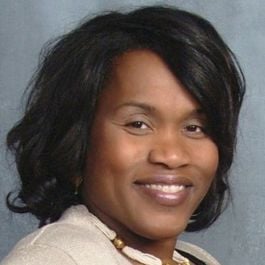For many women, growing in their career can mean a winding path upward, taking one or more lateral career moves in order to reach the position that ultimately suits them best. It is important for women in the corporate world to see the path to success walked by other women — having a female role model can be all it takes to provide confidence and guidance on their own journey.
For many of the women Built In Chicago spoke to about their lateral career moves, their connection to other career women is at the forefront of their minds. Helen Maijub of CSG, for example, would not have been able to make her advantageous lateral moves without the support of women in higher positions acting as mentors.
“Their support, open-mindedness and forward-thinking approach have made it seamless for me to unlock my full potential in my new role,” she said. Meanwhile, Demoda Ogunsanya of TransUnion utilized TransUnion’s Women Networking Resource Group to connect to other women.
By making a lateral career move part of their path to advancement, these women were able to leverage their unique skills and experiences to move up the corporate ladder in the long run. Built In Chicago sat down with female leaders from KPI Sense, CSG, TransUnion Corporation and Arity to learn more about their journey and how their lateral career moves helped them build their careers.
Making a lateral career move can feel pretty scary. How did you know it was the right move for you? And what steps did you take to make it happen?
Early in my career, I made a number of lateral moves. I started at my last company as a technical support representative. I had no idea what I wanted to do long term — in fact, I majored in film in college. Technical support was just supposed to be a temporary job until I figured out what I really wanted to do. After a year or so in that job, I started asking adjacent teams if they needed any help. Slowly, I started taking on new and different responsibilities. Some things I took on were tedious, but they taught me more about the internal works of our very large company. Other things got me excited, and I learned how passionate I was about problem solving.
Throughout this journey, I changed roles two or three times, always making lateral moves but learning new and different things. After a while, I found myself gravitating towards product management, something I didn't even know existed when I started in technical support. Making those lateral moves gave me the freedom to explore what other opportunities surrounded me and helped me find a path that ultimately made sense for me.
When it comes to your career trajectory, professional growth or general passion for your job, what has transitioning into this new role unlocked for you?
I’ve recently moved into a new role that was not lateral in position, but better aligned with the responsibilities I already had in my old role. By making lateral moves early in my career, I was able to gain a wide variety of skills that gave me a unique perspective no matter what room I was in. This was hugely helpful in getting the role I have now because my background wasn’t like everyone else in the pool of candidates — I came with different skill sets that I learned from each role I took on. I have customer support experience, but I also know data analytics. I can create processes for communicating internally between teams, but I also have experience understanding and reading technical specs. Each one of those skills came from a different role or team reorganization.
Eventually, I was able to take all of the skills I’d collected and focus them into a role that fit me best — product management. Not only do those skills help me in my day-to-day life, they also differentiate me from others who do the same job but with a different background. In tech there are many trajectories to get you where you want to go, but I find having a unique background can give you forward momentum in the long run.
Especially as women, we often convince ourselves that more work means more success — but often more work just means more work.”
What advice do you have for other people who are considering making a lateral career move?
My best advice before making a lateral move is to think about what you will be gaining. When talking about lateral moves, what we mean is that you won't advance in position or pay — if you’re already taking on more responsibilities than you’re supposed to be in your current position, even a promotion can feel lateral. Making lateral moves made a lot of sense for me when I didn’t know what I wanted long term. It gave me the freedom to try new things and accumulate new skills.
If you don’t know what you want, use lateral moves to help you narrow it down. If you do know what you want, you can still use lateral moves to get you closer to an organization you’re interested in or acquire new skills you know you’ll need in the future. Just remember before you make any moves to identify if you’re getting new skills or just being roped into taking on additional responsibilities. Especially as women, we often convince ourselves that more work means more success — but often more work just means more work. Unfortunately, working long hours doesn't guarantee you the promotion or better role in the long run; it’s the skills you acquire and how you can use them in the future that will put you ahead.
Making a lateral career move can feel pretty scary. How did you know it was the right move for you? And what steps did you take to make it happen?
At my former job, when the lateral move was presented to me it seemed scary because I felt like the career vision that I had for myself wasn’t understood. Nonetheless, I knew it was the right move for me because it opened the door to the field I wanted to be a part of as a recruitment marketing program manager. I began to speak my truth to anybody that would listen and expressed my relentless passion towards what I knew was just the beginning of a great career. Soon enough, it became apparent to leadership, who finally understood what my career vision was and created this job for the first time at the organization. Fast forward about a year and a half and I find myself at an even greater organization, really exploring my career and already growing at CSG.
I have been very blessed to be able to count on other female leaders that have helped lift me to the next step on the corporate ladder.”
When it comes to your career trajectory, professional growth or general passion for your job, what has transitioning into this new role unlocked for you?
I have been very blessed to be able to count on other female leaders that have helped lift me to the next step on the corporate ladder. Their support, open-mindedness and forward-thinking approach have made it seamless for me to unlock my full potential in my new role at CSG as a social recruitment marketing strategist — an opportunity that would not have been available had I not taken a lateral move. In this new role, I am able to define a plan to attract candidates in this new candidate market, create my own team to support the organization while striving to achieve my vision and unlock the opportunity to return the favor and make way for other women to grow their careers.
What challenges did you face while establishing yourself in this new career, and how did you overcome those challenges?
With any transition, change follows. I saw this new role as like taking an online course with minimal teacher exposure and a lot of self-learning. Therefore, the biggest challenge I faced was accepting that there was a lot to learn in this new role for me to actually grow and add value. This meant many weeks of research, trial and error and raw conversations with my leadership to help them be patient with me as I grew stronger in knowledge and learned who to lean on and for what. I do not think this is a challenge unique to a lateral move — it should be an ongoing desire just to grow in this capacity — but it certainly was a reality that I faced. I overcame this by continually rising to each challenge of things that I didn’t know and by being patient with myself to grow in understanding.
Making a lateral career move can feel pretty scary. How did you know it was the right move for you? And what steps did you take to make it happen?
As a professional, I equipped myself with the leadership and technical skills required to advance my career laterally or vertically. I was confident in taking the new opportunity because I had properly laid the groundwork and was “next level prepared.”
I’d recently graduated from a TransUnion supported leadership program, and my skills and market awareness were heightened. In addition, to align with the application management role I was in at the time, I obtained my AWS Cloud Practitioner certification, while using resources that are available to all TU associates. All of these steps made me confident in the timing to make this new career move.
Find a job interest that you love — that passion will open many doors to learn and grow.”
When it comes to your career trajectory, professional growth or general passion for your job, what has transitioning into this new role unlocked for you?
In my previous role as an application development manager, I communicated with internal customers, such as product owners, VPs of operations and even our CIO on certain occasions — but those encounters were from a technical lens of the business. In my new senior advisor role as US markets customer communications lead, I collaborate with executive sales leaders and engage with our top 20 customer executives. This role has unlocked a level of interpersonal engagement I had not previously exercised. The content of the conversations is slightly different but the goal remains the same: Articulate what best-in-class solution we will be delivering and understand what more we can do to meet our customers’ needs. It is surreal to experience business from this perspective. Moreover, since I believe in the products and services we are delivering to market, I can see a strong correlation of my current customer successes to the internal customer communications foundation from my last ten years.
What advice do you have for other people who are considering making a lateral career move?
My advice to others considering a lateral career move is work in excellence and be in a perpetual ready state. Master the role you currently perform because anything worth doing is worth doing well. Also, keep an eye out for tangential opportunities to network because they may expose you to resources and career opportunities you may not have considered.
Examples of what I have done include: Signing up for FUTURO social events, which is an internal networking resource group at TU; attending TU’s Women’s Networking Resource Group (WNRG), which is a lunch and learn leadership events; participating in company challenges around health and wellness; and attending company picnics and holiday parties. There are also virtual opportunities to experience these events online and learn more of what you might like to pursue at TransUnion. So find a job interest that you love — that passion will exude in your work, overflow into your networking relationships and open many doors to learn and grow.
Making a lateral career move can feel pretty scary. How did you know it was the right move for you? And what steps did you take to make it happen?
Thanks to the managers that I’ve had the privilege of working with in the past, I’ve never found making lateral moves scary. When evaluating a lateral move, it felt right when not only did I believe in the company and the work, but I was also able to learn something new or stretch myself in the new role.
Most of my career moves have been because the manager knew me or knew someone I worked with and felt like I could bring new perspectives or skills to the job. My most current move was when I joined the operational excellence team at Arity. My new leader and I had worked on projects together in the past and I knew that it was the right move for me. The team I had built in my prior role was strong and able to run what we had created together. I was really excited about the new work I would be doing and the impact I could have on Arity in my new role in operational excellence.
The lateral career move should be beneficial for you in that it allows you exposure to new people, opportunities and skills.”
When it comes to your career trajectory, professional growth or general passion for your job, what has transitioning into this new role unlocked for you?
This new role gives me line of sight and exposure into many areas of our business. It’s been a lot of fun for me as I work across all departments, working on business development and supplier contracts. I also am managing a technology group, which is brand new for me. As a result, I’ve had the opportunity to learn new technology and get better acquainted with Salesforce and Jira — which has not only added to the challenge of my job, but also helped keep my skills relevant.
What advice do you have for other people who are considering making a lateral career move?
The advice I have for other people who are considering making a lateral career move is that these moves are not to be feared — but if you are going to make a lateral career move, you should do it for the right reasons. A lateral career move should be beneficial for you in that it allows you exposure to new people, opportunities and skills. Lateral career moves can be a great way to keep challenging yourself and grow as a professional.













